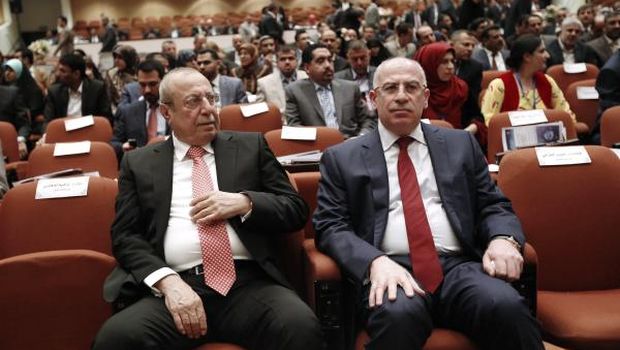
Osama Al-Nujaifi, right, speaker of the Iraqi Council of Representatives, and Iraq’s Deputy Prime Minister Rose Nuri Shaways sit as they attend a session at the parliament headquarters in Baghdad, Iraq on July 1, 2014. (Reuters/Thaier Al-Sudani)
Baghdad, Asharq Al-Awsat—Iraqi politicians on Tuesday appeared to move closer to forming a new government despite embattled Prime Minister Nuri Al-Maliki refusing to give up his controversial bid for a third term in office.
Kurdish political parties have narrowed down their candidates to replace outgoing Iraqi President Jalal Talabani while Salim Al-Jabouri, head of the Diyala is our Identity party has pulled ahead in the race for the position of speaker of parliament. The post of prime minister remains the last of the top three executive posts in Iraq that needs to be filled.
Former Kurdistan Regional Government (KRG) prime minister Barham Salih looks set to compete with Governor of Kirkuk Najmiddin Karim to be named as the official candidate to replace ailing President Talabani.
Iraq’s presidency, largely a ceremonial position, is usually held by a Kurd, with the prime minister being a Shi’ite and the speaker of parliament a Sunni. Iraq’s Kurds have roundly rejected a third Maliki term, indicating they will seek to hold a referendum on independence following the advance of Islamic State of Iraq and Syria (ISIS) fighters in the country and the ongoing political crisis in Baghdad.
Speaking to Asharq Al-Awsat, Kurdistan Alliance spokesman Mouayad Tayyib said: “Kurdish political parties authorized KRG President Massoud Barzani to announce a united Kurdish position, representing all Kurdish political parties, affirming that they will not participate in any government led by Nuri Al-Maliki.”
President Barzani announced on July 1 that a referendum on the region’s independence will be held within the coming months.
Prominent Sunni politician Salim Al-Jabouri appeared to be favorite to be named as Iraq’s new speaker of parliament after outgoing speaker Osama Al-Nujaifi, a strong critic of Maliki, said he would not seek a second term in office if the prime minister agreed to give up his ambitions for a third term. However, Maliki subsequently rejected Nujaifi’s deal, meaning that the Sunni-led Mutahidoun bloc leader could seek a new term as speaker.
Mohamed Al-Khalidi, a leading figure in Nujaifi’s Mutahidoun parliamentary bloc, told Asharq Al-Awsat: “Iraq’s Sunnis have yet to finalize their decision on the issues regarding the nomination for speaker.”
Khalidi affirmed that Maliki’s announcement of not giving up his bid for prime minister means that Nujaifi could similarly seek a new term as speaker.
“Despite the differences that exist within all blocs, including the Sunnis, there is near consensus that securing a candidate for the [position of] speaker of parliament will not be an obstacle to the constitutional process,” he added.
Khalidi criticized the decision by the Shi’ite-led National Alliance to postpone parliament until after the end of Ramadan. “This is not just a constitutional violation, it is a constitutional farce,” he told Asharq Al-Awsat.
